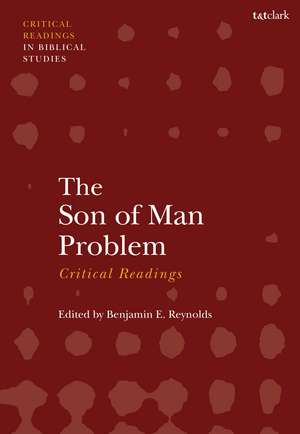The Son of Man Problem: Critical Readings: T&T Clark Critical Readings in Biblical Studies
Editat de Benjamin E. Reynoldsen Limba Engleză Hardback – 21 mar 2018
Preț: 923.97 lei
Preț vechi: 1628.53 lei
-43% Nou
Puncte Express: 1386
Preț estimativ în valută:
176.89€ • 183.86$ • 146.66£
176.89€ • 183.86$ • 146.66£
Carte disponibilă
Livrare economică 18 ianuarie-01 februarie 25
Preluare comenzi: 021 569.72.76
Specificații
ISBN-13: 9780567670120
ISBN-10: 0567670120
Pagini: 600
Dimensiuni: 169 x 244 mm
Greutate: 1.18 kg
Editura: Bloomsbury Publishing
Colecția T&T Clark
Seria T&T Clark Critical Readings in Biblical Studies
Locul publicării:London, United Kingdom
ISBN-10: 0567670120
Pagini: 600
Dimensiuni: 169 x 244 mm
Greutate: 1.18 kg
Editura: Bloomsbury Publishing
Colecția T&T Clark
Seria T&T Clark Critical Readings in Biblical Studies
Locul publicării:London, United Kingdom
Caracteristici
The history of the debate on the Son of Man problem is traced and introduced through careful positioning of the most influential pieces on the topic
Notă biografică
Benjamin E. Reynolds is Chair of the Department of Biblical Studies and Theology, and Associate Professor of New Testament at Tyndale University College, Canada.
Cuprins
AbbreviationsPreface and AcknowledgmentsPart One: Son of Man Debate and MethodIntroduction to Part 11. Is the Son of Man Problem Insoluble? - A.J.B. Higgins, St David's University College, UK2. Neglected Features in the Problem of "the Son of Man." - C.F.D. Moule, University of Cambridge, UK3. Is the Son of Man Problem Really Insoluble? - Morna D. Hooker, University of Cambridge, UK4. New research on the Son of Man Problem - Carsten Colpe, University of Göttingen, Germany5. Method in Our Madness, and Madness in Their Methods: Some Approaches to the Son of Man Problem in Recent Scholarship - Maurice Casey, University of Nottingham, UK6. Further Reflections on 'the Son of Man:' The Origins and Developments of the Title - Frederick H. Borsch, Lutheran Theological Seminary, USA7. The Synoptic 'Son of Man' Sayings in the Light of Linguistic Study - I. Howard Marshall, University of Aberdeen, UK. 8. Summary and Concluding Observations - Larry W. Hurtado, University of Edinburgh, UKAnnotated Bibliography: Son of Man Debate and Methodological Concerns Part Two: Idiomatic Solutions to the Son of Man ProblemIntroduction to Part 29. The Use of Son of Man in Jewish Aramaic, Appendix E - Geza Vermes, University of Oxford, UK10. The New Testament Title "Son of Man" Philologically Considered - Joseph A. Fitzmyer, Catholic University of America, USA11. The Son of Man: "A Man in My Position" or "Someone"?' - Richard Bauckham, University of St Andrews, UK12. General, Generic and Indefinite: The Use of the Term "Son of Man" in Aramaic Sources and in the Teaching of Jesus - Maurice Casey, University of Nottingham, UK13. Speaking up for Qumran, Dalman and the Son of Man: Was Bar Enasha a Common Term for "Man" in the Time of Jesus?' - Paul Owen, Montreat University, USA, and David Shepherd, Trinity College Dublin, Ireland14. The Son of Man Debate Revisited (1960-2010) - Geza Vermes, University of Oxford, UK15. Expressing Definiteness in Aramaic: A Response to Casey's Theory Concerning the Son of Man Sayings - Peter J. Williams, Tyndale House, UKAnnotated Bibliography: Idiomatic Solutions to the Son of Man Problem Part Three: Danielic Origins of 'the Son of Man'Introduction to Part 216. The Son of Man in Daniel, Enoch, and the Gospels - T.W. Manson, University of Manchester, UK17. The Son of Man in Ancient Judaism and Primitive Christianity: A Suggestion - Norman Perrin, University of Chicago, USA18. Exit the Apocalyptic Son of Man - Ragnar Leivestad, University of Oslo, Norway19. Re-enter the Apocalyptic Son of Man - Barnabas Lindars, University of Manchester, UK20. The Messianic Associations of "The Son of Man." - William Horbury, University of Cambridge, UK21. The Apocalyptic Son of Man Sayings - Adela Yarbro Collins, Yale University, USA22. The Danielic Son of Man - John. J Collins, Yale University School, USA23. 'Son of Man': Its Origin and Meaning in Second Temple Judaism - Lester L. Grabbe, University of Hull, UKAnnotated Bibliography: Danielic Origins of 'the Son of Man' Part Four: The Son of Man in the Septuagint Version of Daniel 7Introduction to Part 423. Daniel 7,13 and the Septuagint - J. Lust, Leuven University, Belgium24. One like a Son of Man as the Ancient of Days" in the Old Greek Recension of Daniel 7:13: Scribal Error or Theological Translation? - Loren T. Stuckenbruck, Ludwig Maximillians University Munich, Germany25. The Septuagint Version of Daniel 7,13-14 - Otfried Hofius, University of Tubingen, Germany26. The "One Like a Son of Man" According to the Old Greek of Daniel 7,13-14 - Benjamin E. Reynolds, Tyndale University, CanadaAnnotated Bibliography: 'One like a son of man' in the Greek Versions of Daniel 7Select Bibliography Index of References Index of AuthorsIndex of Subjects
Recenzii
This splendid collection provides classic and seminal essays on the Son of Man problem in the gospels. Key contributions from both past and present are here assembled, with an extensive and informative introduction showing how the debate has developed over the years. The book will provide a rich resource for all those interested in one of the most fascinating problems in gospel studies today.
This selection of twenty-seven of the most influential articles on the meaning of 'Son of Man', covering 1959 to 2016, is a valuable gift to scholarship. A well-informed general introduction, as well as introductions and annotated bibliographies to each of the four sections, makes the volume an indispensable tool in the future discussion of this central question in New Testament theology, contrasting highly different presuppositions to reach for the elusive and definitive conclusion.
This selection of twenty-seven of the most influential articles on the meaning of 'Son of Man', covering 1959 to 2016, is a valuable gift to scholarship. A well-informed general introduction, as well as introductions and annotated bibliographies to each of the four sections, makes the volume an indispensable tool in the future discussion of this central question in New Testament theology, contrasting highly different presuppositions to reach for the elusive and definitive conclusion.






